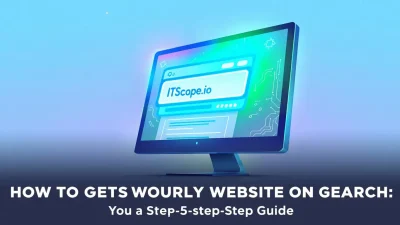Ever launched a website only to wonder why no one seems to find it on Google? You’re not alone. Learning how to get your website on search engines is crucial for web visibility. From reaching your target audience to boosting credibility, mastering search engine essentials is a must for any digital presence.
In this guide, we’ll unravel the mysteries behind search engine indexing and optimization, providing you with actionable steps to ensure your website doesn’t just exist but thrives in the vast world of the internet. Ready to dive in? Let’s navigate these waters together!
Here’s what you can expect to learn today:
Table of Contents
- Understanding the Basics of Search Engine Indexing
- Optimizing On-Page SEO for Better Visibility
- Submitting Your Site to Search Engines: A Step-by-Step Guide
- Building Quality Backlinks
- Leveraging Social Media to Enhance Discovery
- Common Mistakes and How to Avoid Them
- FAQs
- Conclusion
Understanding the Basics of Search Engine Indexing
What does it mean to get your website on search engines, and why is it such a big deal? Well, search engine indexing is the process that makes your website visible on Google, Bing, and other platforms. It’s like having a spotlight turned on your digital presence! When search engines crawl your site, they need to understand its content, relevance, and how it’s structured. This is the magic behind how to get website on search engines effectively.
How Search Engines Crawl and Index
Let’s dive into the mechanics. When talking about SEO, understanding this concept is crucial. Crawlers, the little bots sent out by search engines, scan your pages to see what they’re about. They follow links and use keywords to understand your content. Then, they add it to their vast directories, or ‘indexes’, where they retrieve it based on users’ search queries.
- Submit your Site: It’s crucial to let search engines know that your website exists. You can do this by manually submitting your site which some might call an ‘SEO submit.’ Resources like Kinsta, Ahrefs, and The Fool provide great guides.
Importance of SEO Optimization
SEO isn’t just for experts; it’s a critical practice for anyone looking to improve online visibility. When search engines ‘understand’ your site better, they rank it higher, bringing more visitors your way. One powerful tip is: integrate relevant keywords like ‘how to get website on search engines’ naturally within your content. This boosts your chance to appear in user searches.
Understanding the basics of search engine indexing can transform your online presence, making it stand out effortlessly in search results.
Keeping up with what’s new and what’s working in SEO strategies is a must. For those keen to dive deeper into mastering search rankings, don’t miss our comprehensive SEO Tutorial.
Optimizing On-Page SEO for Better Visibility
Want to learn how to get your website on search engines? Start by mastering on-page SEO, an essential part of any successful online strategy. Proper on-page optimization ensures your website not only gets indexed but also ranks higher in search results.
Understanding Key Elements
First, grasp the key components of on-page SEO. Effective titles and meta descriptions are crucial. They communicate your page’s intent to both users and search engines. Craft eye-catching headlines and tailored descriptions that incorporate relevant keywords like “SEO submit” to stand out.
- Title Tags: Use clear and concise title tags under 60 characters that include your focus keyword.
- Meta Descriptions: Though not a ranking factor, an engaging meta description can boost your click-through rates.
Content Quality
Quality content reigns supreme in SEO. Ensure your content is relevant, informative, and packed with valuable insights. This keeps visitors engaged and encourages longer page dwell times, signaling to search engines like Google that your page is worthy of higher ranks.
Alt Tags and Images
Don’t overlook images. Use descriptive alt tags on all images to enhance accessibility and help search engines understand your content. For example, when explaining “how to get website on search engines,” include images showcasing step-by-step processes and label them accordingly.
Internal Linking
Build a network of internal links within your site. This improves navigation and helps search engines crawl your site efficiently. By linking to resources like the SEO Tutorial: The Ultimate Guide to Master Search Rankings, you provide valuable information and keep visitors on your site longer.
Optimizing each on-page element can significantly enhance your search engine visibility.
For more details on submitting your website to search engines, explore expert tips from Kinsta, or check Ahrefs’ comprehensive guide for step-by-step strategies.
Submitting Your Site to Search Engines: A Step-by-Step Guide
If you’ve ever wondered how to get your website on search engines, you’re not alone. Submitting your site effectively can boost visibility and attract more visitors. Let’s dive into the steps required for successful submission.
- Verify Your Website Ownership: Start by signing up for Google Search Console and Bing Webmaster Tools. These platforms allow you to submit your site manually and ensure it’s recognized by major search engines.
- Create a Sitemap: A sitemap is essential. It acts like a roadmap for search engines, helping them crawl your site efficiently. You can generate one using tools like Yoast SEO or Google’s Sitemap Generator.
- Submit Your Sitemap: After creating a sitemap, log into your Google Search Console. Go to the ‘Sitemaps’ section and input your sitemap URL, then click ‘Submit’. Repeat the process for Bing Webmaster Tools using the ‘Sitemaps’ option.
- Optimize for Local SEO: Ensure your site is optimized for local SEO by including your business name, address, and phone number prominently. Registering with Google My Business enhances your local presence.
Following these steps will help you understand how to get your website on search engines effectively. For an in-depth look, visit our SEO Tutorial: The Ultimate Guide to Master Search Rankings.
Submitting your site manually can enhance your site’s discoverability and performance over time.
SEO Submission Tools
To streamline the process, consider leveraging SEO tools like Kinsta, Ahrefs, and Fool to assist in submission and tracking performance. These resources can shed more light on how to get your website on search engines quickly.
By following this guide, you’ll not only gain visibility but also improve your site’s ranking potential in the digital landscape.
Building Quality Backlinks
Are you wondering how to get a website on search engines? Building quality backlinks is an essential step! Backlinks act as a vote of confidence, enhancing your site’s visibility. Let’s dive into effective strategies to create these links.
- Guest Blogging: Write high-quality content for reputable websites. This not only boosts your authority but also provides a platform for linking back to your site.
- Engage in Social Media: Share your content widely. Social platforms can drive traffic and naturally accumulate backlinks.
- Directory Submissions: Submit your site to directories relevant to your niche. This technique aligns with the idea of seo submit, solidifying your online presence.
Reach Out to Influencers
Identifying key players in your industry can amplify your backlink building efforts. Collaborate with influencers by offering them value, such as mutual content sharing. Their endorsement can skyrocket your site’s traffic.
Backlinks are vital for increasing a website’s search engine ranking. Quality outweighs quantity.
Bonus Tip: Consistency is key. Regularly update and refresh your backlink strategy to adapt to changing algorithms and stay ahead of the curve.
Want to dive deeper into SEO strategies? Check out our SEO Tutorial: The Ultimate Guide to Master Search Rankings for more comprehensive insights.
Leveraging Social Media to Enhance Discovery
In today’s digital age, social media plays a crucial role in how to get website on search engines. By strategically utilizing these platforms, you can significantly boost your site’s visibility and discovery.
- Create Shareable Content: Content that resonates with your audience encourages sharing, increasing the likelihood of reaching new potential site visitors.
- Use SEO-Optimized Hashtags: Well-researched hashtags can align your content with current trends, enhancing its discoverability on social platforms. For more on optimizing SEO, check out our SEO Tutorial: The Ultimate Guide to Master Search Rankings.
- Engage with Influencers: Collaborating with influencers in your niche can expand your reach. They help amplify your brand message to a broader audience, indirectly aiding your site’s search engine ranking through increased traffic.
For additional strategies, explore resources on submitting your website to search engines, or learn about technical steps from experts at Ahrefs and The Motley Fool. Social media is more than a marketing tool; it’s a powerful ally in your SEO efforts, propelling your site to the top of search results.
Common Mistakes and How to Avoid Them
When learning how to get a website on search engines, it’s easy to make mistakes. But don’t fret! Awareness is your first step to success, and I’m here to guide you through the potential pitfalls.
- Ignoring SEO Fundamentals: Don’t skip the basics! Without a strong foundation, your efforts could go unnoticed. Make sure to understand the SEO essentials.
- Not Submitting Your Site: Often, people forget to actively submit their site. Learn more on how to submit your website to search engines.
- Using Shady Techniques: While shortcuts may seem tempting, they often lead to penalties. Stick to ethical SEO practices for sustainable results.
The Importance of Quality Content
Quality content isn’t just appreciated—it’s expected. Sites that consistently publish valuable content perform better in search rankings. This involves investing time in helpful, well-researched materials that resonate with your audience.
Avoiding these common mistakes can significantly boost your chances of ranking higher in search results when learning how to get a website on search engines.
Need more guidance? Check out an in-depth look here at ways to improve your site’s visibility.
FAQs
What is the best way to submit my website to search engines?
The most effective way is using Google Search Console and Bing Webmaster Tools. These platforms help you submit your sitemap and keep track of indexing. For a detailed guide, check out our SEO Tutorial, and explore resources like Kinsta’s guide.
Is SEO submit necessary for search visibility?
Yes, submitting your site ensures it is recognized by search engines. It helps improve visibility, particularly when paired with other SEO techniques. Learn more from Ahrefs’ expert tips.
How long does it take for a website to get indexed?
Indexing times can vary but typically range from a few days to a couple of weeks. Ensuring your site is SEO-optimized speeds up this process. Check out The Ascent for tips on accelerating indexing.
Should I optimize my website before I submit it to search engines?
Absolutely! Well-optimized content boosts your site’s search engine performance. Start with keyword integration and meta tag optimization.
Do I need to submit my website multiple times to different search engines?
No, a single submission via Search Console tools suffices. Frequent updates require resubmission only if your site structure changes significantly.
Conclusion
Mastering the essentials of how to get website on search engines is crucial for boosting your online visibility. By utilizing strategies like SEO submit, you’ve taken the fundamental steps toward ranking success. Remember, the journey doesn’t stop at submission.
Keep enhancing your site’s content and structure to maintain strong search engine ranking positions. Dive deeper into advanced SEO techniques with our SEO Tutorial: The Ultimate Guide to Master Search Rankings, which offers comprehensive insights into optimizing your digital presence.
Explore additional best practices for submitting websites on platforms like Kinsta, Ahrefs, and The Motley Fool to stay ahead of the competition.
Getting your website on search engines is just the beginning; continuous optimization is the key to sustained success.



